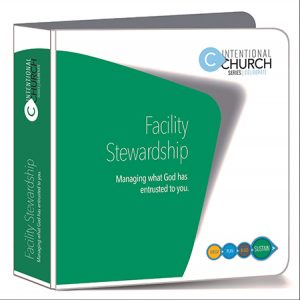By Tim Cool
Preventive maintenance isn’t rocket science!

As I’ve studied the facilities management field and researched the cause and effect of the decay of everything we build, I’m more confused about why we, as God’s stewards, do such a poor job of fulfilling those duties. We would rather put off today what we can go into debt for tomorrow.
Hmm. Is that good stewardship? Sounds like many government officials.
I have great respect for Kevin Folsom, director of facilities and plant operations at Dallas Theological Seminary. He “gets” the need to be proactive. He wrote a white paper entitled, Sustainable facilities vs. Sustainable Facilities. (Download it here) It’s an excellent resource; and frankly, some of it is over my head — Kevin is one smart dude!
Here’s a quote:
 There are numerous levels that can be used to go about this, but to start we have to remember our early physics lessons in high school about the Second Law of Thermodynamics. Everything we build will decay, but it may last longer if properly maintained. So, here’s a puzzling question… If we build facilities that the natural law causes them to decay at fairly predictable rates throughout its birth to burial, why do we not plan for it?
There are numerous levels that can be used to go about this, but to start we have to remember our early physics lessons in high school about the Second Law of Thermodynamics. Everything we build will decay, but it may last longer if properly maintained. So, here’s a puzzling question… If we build facilities that the natural law causes them to decay at fairly predictable rates throughout its birth to burial, why do we not plan for it?
According to a research project conducted a few years ago, facilities — any facility — will deteriorate at a rate of 1 percent to 2 percent per year, assuming regular preventive maintenance. However, in most cases, this rate of deterioration more than doubles if the regular, systematic preventive maintenance is not performed.
Why, as church leaders, do we avoid addressing and planning for the inevitable? Would you drive your new car and never change the oil until the engine seizes up, and then cough over a huge amount of money for a new engine? That doesn’t make any sense to me.
But what about the day-to-day stuff?
“Why, as church leaders, do we avoid addressing and planning for the inevitable? Would you drive your new car and never change the oil until the engine seizes up, and then cough over a huge amount of money for a new engine? That doesn’t make any sense to me.”
What does it mean to be proactive versus reactive?

In the second chapter of this series, we explored the significant differences between management and maintenance. Now we need to drill down another layer and look at the differences between proactive and reactive maintenance.
Recently, I was tracking a LinkedIn conversation with a Facility Management (FM) “group” of which I’m a member. I found the discussion very interesting; I think you will, too.
Keep in mind these are people providing facility management services in the “secular” arena (for example, complex commercial buildings — but wait: our ministry facilities are also complex commercial buildings. Hmm.) As you read these takeaways, substitute the word “company” with “church” or “ministry.”
Here’s the sequence of discussions:
 You missed a critical part of the equation to switching from reactive to proactive. FMs need time to analyze information, develop a strategy, and implement things that are proactive. Unfortunately, they’re often too busy with the day-to-day issues and headaches.
You missed a critical part of the equation to switching from reactive to proactive. FMs need time to analyze information, develop a strategy, and implement things that are proactive. Unfortunately, they’re often too busy with the day-to-day issues and headaches.
Many of them also are very hands-on, get-things-done kinds of people who don’t think they’re earning their pay if they spend time in the office (or somewhere else, preferably) simply thinking and planning.

I gave a seminar at the IIDEX / Neocon conference in Toronto last year about selling FM in your company. I talked about this issue as one of the reasons the profession isn’t as respected as those of the finance, HR, law, engineering and other roles in their company. (TIM COOL INSERT: … or the “pastoral staff,” or the ministry initiatives.)
FMs need to step off the treadmill every now and then in order to switch from being reactive to proactive and strategic.
All the above are excellent points and critical to running a professional FM department. I think the difference between being considered a low-paid “necessary evil” for the company and a respected,

higher-paid professional is the strategic planning and value-driven dynamic.
In summary, I feel that a balanced approach works best with different service levels depending on what’s being maintained. There’s no right or wrong answer in the planned-versus-reactive debate, but one thing is certain — any FM strategy needs to be underpinned by accurate and comprehensive asset data and a detailed understanding of the underlying business need.
So, how are you doing in developing a professional, proactive and strategic facility management department (or plan) for your church and ministry? Are the facility management efforts at your church the proverbial “redheaded stepchild” of the ministry? Is FM only a necessary evil, or is it a critical part of your overall stewardship initiative? If it’s the latter, I congratulate you and would covet your input on how you’re accomplishing that.
I believe you’re on the right track if you’ve embraced a facility stewardship perspective.
Tim Cool @TLCool is founder of Cool Solutions Group, and has assisted nearly 400 U.S. churches (equating to more than 4 million square feet) with their facility needs. He has collaborated with churches in the areas of facility needs analysis, design coordination, pre-construction and construction management, as well as life cycle planning / facility management. Cool Solutions Group is also the developer of eSPACE software products, including Event Scheduler, Work Order Management and HVAC integration.
Cool has written three books: Successful Master Planning: More Than Pretty Pictures; Why Church Buildings Matter: The Story of Your Space; and Church Locality, which is co-written by Jim Tomberlin, as well as a manual series entitled “Intentional Church.”



In your article, I have learned so much about facility maintenance. As a professional, this is a very helpful article for me. You have nicely explained. Thanks for sharing this.